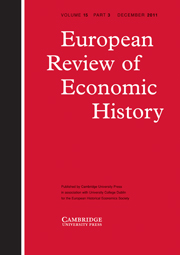Crossref Citations
This article has been cited by the following publications. This list is generated based on data provided by
Crossref.
Estevadeordal, A.
Frantz, B.
and
Taylor, A. M.
2003.
The Rise and Fall of World Trade, 1870-1939.
The Quarterly Journal of Economics,
Vol. 118,
Issue. 2,
p.
359.
Jacks, David S.
2005.
Intra- and international commodity market integration in the Atlantic economy, 1800–1913.
Explorations in Economic History,
Vol. 42,
Issue. 3,
p.
381.
Williamson, Jeffrey G.
2005.
Wider Perspectives on Global Development.
p.
136.
Bernhofen, Daniel M
and
Brown, John C
2005.
An Empirical Assessment of the Comparative Advantage Gains from Trade: Evidence from Japan.
American Economic Review,
Vol. 95,
Issue. 1,
p.
208.
O’rourke, Kevin H.
and
Williamson, Jeffrey G.
2005.
From Malthus to Ohlin: Trade, Industrialisation and Distribution Since 1500.
Journal of Economic Growth,
Vol. 10,
Issue. 1,
p.
5.
BROADBERRY, STEPHEN
and
GUPTA, BISHNUPRIYA
2006.
The early modern great divergence: wages, prices and economic development in Europe and Asia, 1500–18001.
The Economic History Review,
Vol. 59,
Issue. 1,
p.
2.
Sylla, Richard
Wilson, Jack W.
and
Wright, Robert E.
2006.
Integration of Trans-Atlantic Capital Markets, 1790–1845*.
Review of Finance,
Vol. 10,
Issue. 4,
p.
613.
Norel, Philippe
2006.
La question politique en économie internationale.
p.
158.
Deceulaer, Harald
2006.
Between Medieval Continuities and Early Modern Change: Proto-industrialization and Consumption in the Southern Low Countries (1300–1800).
Textile History,
Vol. 37,
Issue. 2,
p.
123.
Sachsenmaier, Dominic
2006.
Global history and critiques of western perspectives.
Comparative Education,
Vol. 42,
Issue. 3,
p.
451.
O'Rourke, Kevin H.
Rahman, Ahmed
and
Taylor, Alan M.
2007.
Trade, Knowledge, and the Industrial Revolution.
SSRN Electronic Journal,
O'Rourke, Kevin H.
Rahman, Ahmed
and
Taylor, Alan M.
2007.
Trade, Knowledge and the Industrial Revolution.
SSRN Electronic Journal,
Perraton, Jonathan
2007.
Evaluating Marxian contributions to development economics.
Journal of Economic Methodology,
Vol. 14,
Issue. 1,
p.
27.
Roses, Joan R.
O'Rourke, Kevin H.
and
Williamson, Jeffrey G.
2007.
Globalization, Growth and Distribution in Spain 1500-1913.
SSRN Electronic Journal,
Norel, Philippe
2007.
Mondialisation et histoire : une approche épistémologique.
Revue internationale de philosophie,
Vol. n° 239,
Issue. 1,
p.
33.
Pitts, Martin
2008.
Globalizing the local in Roman Britain: An anthropological approach to social change.
Journal of Anthropological Archaeology,
Vol. 27,
Issue. 4,
p.
493.
McCANTS, ANNE E. C.
2008.
Poor consumers as global consumers: the diffusion of tea and coffee drinking in the eighteenth century1.
The Economic History Review,
Vol. 61,
Issue. s1,
p.
172.
Sharp, Paul Richard
2008.
Pushing Wheat: Why Supply Mattered for the American Grain Invasion of Britain in the Nineteenth Century.
SSRN Electronic Journal,
Flynn, Dennis O.
and
Giráldez , Arturo
2008.
BORN AGAIN: GLOBALIZATION'S SIXTEENTH CENTURY ORIGINS (ASIAN/GLOBAL VERUS EUROPEAN DYNAMICS).
Pacific Economic Review,
Vol. 13,
Issue. 3,
p.
359.
Pinilla, Vicente
and
Ayuda, María-Isabel
2008.
Market dynamism and international trade: a case study of Mediterranean agricultural products, 1850–1935.
Applied Economics,
Vol. 40,
Issue. 5,
p.
583.




